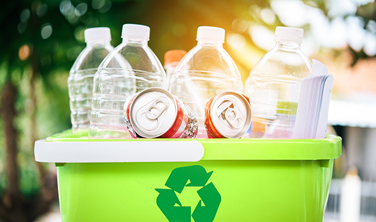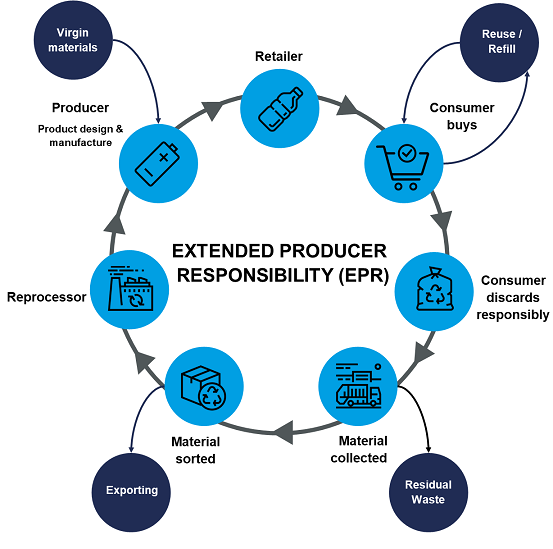What is Extended Producer Responsibility (EPR)?
|
Aims and objectives of EPR
FDF member? Login or register for access to all the lastest updates and to find out how you can get involved. |
Find out more
Background
Food and drink manufacturers fully support the aim to reduce the environmental impact of packaging they use and protect the planet. We have long called for reform of the packaging producer responsibility system to improve transparency and the better targeting of funds towards improving recycling infrastructure. We want to constructively engage with the UK and devolved nations governments to build an efficient and effective system that delivers good recycling outcomes for the long term whilst minimising cost to business and to consumers.
The aim of Extended Producer Responsibility (EPR) is for producers to pay the full net costs of managing and recycling the packaging waste arising from products they place on the market. This will help to drive further circularity of packaging by reducing unnecessary and difficult to recycle packaging and increasing recycling. However taking the learnings from international best practice, there are efficient and cost-effective ways of achieving this and any new recycling schemes must be designed with that in mind.
EPR is a complex project to be delivered at scale and will place substantial new costs on the UK’s food producers much of which will get passed on to consumers.
There are also many interlinkages and interdependencies with the other parts of the Government’s Collection and Packaging Reforms package, namely DRS and consistent collections. A whole systems approach is therefore needed involving correct sequencing, and cross-and inter government working and agreement if we are to achieve the whole system transformation that is needed.
The industry needs assurance that the new system will be as cost efficient and transparent as possible and that it can drive whole system change – from how companies use packaging through to how consumers engage with new recycling systems, as well as how councils manage waste collections and help to drive up recycling rates.
We do have significant concerns about the UK and devolved nations governments’ decision to make the Scheme Administrator a public body. It is FDF’s firm belief that central to achieving successful delivery of EPR, including one where costs are fully optimised, is for the Scheme Administrator to be a producer-led, not for profit body operating to a set of environmental outcomes laid down by Government but with autonomy on how these are delivered. This is the successful norm for effective EPR schemes globally and one the UK should adopt from the outset.
The UK and the devolved nations governments have shown some flexibility by removing proposals to include business waste payments in the overall EPR policy framework. In England and Northern Ireland, the obligation on industry to pay for illegal ground littering has also been removed, a decision we hope the other devolved nations will also adopt.
Food and drink manufacturers along with other parts of the value chain intend to continue to provide their expert advice and to work with the UK and devolved governments to deliver a world leading EPR system.
Are you in scope?
You must take action to comply if the following apply:
- you’re an individual business, subsidiary or group with a registered UK presence
- you have an annual UK turnover of £1 million or more and you handle over 25 tonnes of obligated packaging in a calendar year
- you carry out any of the following activities:
- packaging own-brand products to supply to UK consumers
- using a third party to package and supply own-brand goods to UK consumers
- using unbranded secondary/tertiary to protect goods during transport so they can be supplied to UK consumers
- supplying empty packaging (branded or unbranded) to a business that does not meet the Large Organisation threshold (see definition below)
- importing goods from a brand that does not have a UK presence
- removing packaging from imported goods
- hiring or loaning out reusable packaging to UK third parties
- the owner of an online marketplace facilitating the sale of packaged goods from outside the UK
What you need to do
Small organisation
If annual turnover is £1 million or more and handle 25-50 tonnes of packaging within the UK
or
If annual turnover is £1-2 million and handle over 50 tonnes of packaging within the UK
You are obligated to report your packaging data annually, but will not be financially obligated to contribute recycling or disposal costs.
Register your business through the RPD portal
- An approved person (director or company secretary listed on Companies House) must verify your account
- Submit Jan-Dec 2024 packaging data by 1 April 2025
- Pay a fee to the environmental regulator from 2025
Take steps to record data about all the empty packaging and packaged goods you handle and supply through the UK market.
Large organisation
If annual turnover is £2 million or more and handling more than 50 tonnes of packaging in the UK.
Register your business through the RPD portal
- An approved person (director or company secretary listed on Companies House) must verify your account
- buy PRNs or PERNs to meet your recycling obligations. A compliance scheme can do this on your behalf.
- submit data (in kilograms) about empty packaging or packaged goods you handled or supplied through the UK market
- Pay a fee to the environmental regulator from 2025
- Pay disposal fees for household packaging, with the first bill issued in October 2025
For the period January to June 2024, submit data before 1 October 2024.
For the period July to December 2024, submit data before 1 April 2025.
Producers based in Wales can choose to submit data from the period January to December 2023 in one submission by 1 April 2024 (Subsequent years will repeat the 6 monthly cycle for all UK producers).
You will not be obligated to pay recycling and disposal fees under EPR for the data that you collect during the 2023 compliance year – the first EPR invoices will be delivered in October 2025 for the 2024 compliance year.
This means that you will need to make an additional submission between 1 January 2024 and 1 April 2024 in the style of the previous (Packaging Waste Regulations 2007) regulations, and purchase PRN’s/PERN’s in order to be compliant for 2023.
Note that the Regulations were amended so that from the 1 April 2024 DEFRA have removed the exemption on drinks containers that would have been obligated in a Scottish Deposit Return Scheme (DRS)
What you need to consider
Household and Non-Household packaging
Household packaging will incur additional disposal fees under EPR, so it is important to correctly differentiate between household and non-household packaging when reporting data.
Secondary and Tertiary packaging must be classed as non-household.
Primary and Shipment packaging must be classed as household unless:
- You supply it to a business/public institution which is the end user of the goods or supplies goods to an end user with all packaging removed
- The packaging is for a product only designed for business/public institution used and is not reasonably likely to be disposed of in a household or public bin
- You are an importer and import packaging into the UK which is discarded without being supplied to anyone
You need to be able to show evidence if classing primary or shipment packaging as non-household, and you must keep this evidence for at least 7 years.
Reporting Nation Data
For any organisation that must act under EPR, you must also submit Nation data if you do any of the following:
- supply packaging directly to customers in the UK, where they are the end user of the packaging
- supply empty packaging to UK organisations that are either not legally obligated, or are classed as a small producer
- hire or loan out reusable packaging
- own an online marketplace where organisations that are based outside the UK sell their empty packaging and packaged goods to UK consumers
- import packaged goods into the UK for your own use and discard the packaging
Nation data will need to be reported by 1 December 2024, showing where in the UK (by Nation) you have supplied packaging to an end-user. This includes packaging that you have imported and then discarded.
Organisations that have an annual turnover below £1 million and handle less than 25 tonnes of packaging in a calendar year are non-obligated, and do not need to report any data under EPR.
Mandatory Binary Labelling
Under EPR, all packaging will be required to be labelled using the ‘Recycle Now’ mark showing one of two messages: ‘Recycle’ or ‘Do Not Recycle’. DEFRA is planning on publishing its label artwork and guidance when the regulations come into force.
Mandatory binary labelling will apply to all packaging types including soft, flexible plastics from 1 April 2027.
Stock that was manufactured or imported before 1 April 2027 will not need to be withdrawn or re-packaged, however producers may need to retain proof to provide to the Regulator on request. All packaging manufactured or imported past this date must be compliant with the regulations.
There is no minimum threshold that applies as all packaging is required to be labelled. In some cases, a small organisation can purchase empty packaging that is already labelled.
The Office for Product Safety and Standards (OPSS) will be the organisation responsible for overseeing the labelling requirements.
Further Resources
-
Statutory Instrument and Agreed Positions:
The Packaging Waste (Data Reporting) (England) Regulations 2023
The Packaging Waste (Data Reporting) (England) Amendment Regulations 2024
pEPR Agreed Positions and Technical Interpretations, Version 3 & 4 (EA, SEPA, NIEA)
- DEFRA’s guidance on EPR:
Extended Producer Responsibility for packaging: who is affected and what to do
Packaging data: what to collect for extended producer responsibility
Packaging data: how to create your file for extended producer responsibility
Amendments to pEPR data reporting regulations webinar
- Obligation Checker Tool:
Check if you need to report packaging data
Demonstration of how to use the tool
-
View DEFRA’s webinar recordings which cover an overview of Collections and Packaging Reforms, EPR requirements from 1 January 2023, producer types, data submission, and more.
-
Resources and Waste Forums - hosted by DEFRA and held monthly, for all stakeholders to be kept informed about the reforms programme that includes Extended Producer Responsibility (EPR), Deposit Return Scheme (DRS), and Consistency of Collections.
-
Receive the most up-to-date information on the Collections and Packaging reforms: Sign up to DEFRA's Resources and Waste Newsletter.
Updates
Extended Producer Responsibility for packaging (pEPR): Imminent Data Reporting Deadline
We have been asked by Pack UK, the recently established Scheme Administrator for the UK packaging Extended Producer Responsibility Scheme, to remind members that if they are obligated to report packaging data under the new EPR Regulations they must do so by 1 April 2025.
This deadline applies to both large and small obligated producers as defined in the Regulations; both types of producer must also register with their environmental regulator by 1 April 2025. Guidance on how to register can be found here. A dedicated helpline, 0300 060 0002, is available to support businesses through the process.
Having timely and accurate data helps to ensure that EPR reflects the true cost of managing packaging waste and that these costs are more fairly distributed between all obligated producers. Moreover, organisations who do not submit their packaging data as required by law are at risk of enforcement action being taken against them.
If you are a small organization handling packaging in the UK, it is important to consider whether you have data reporting and registration obligations under the EPR Regulations.
The Regulations class a business as a small organisation if either of the following apply:
- annual turnover between £1 million and £2 million and responsible for supplying or importing more than 25 tonnes of packaging in the UK;
- annual turnover over £1 million and responsible for supplying or importing between 25 tonnes and 50 tonnes of packaging in the UK.
NB those below the lower threshold (turnover under £1m and supply under 25 tonnes of packaging) per year hold no obligations.
Please see the attached note prepared by the Environment Agency to help small organisations help understand their potential obligations
Consultation launched on DRAFT Recyclability Assessment Methodology (RAM)/Guidance
The DRAFT Recyclability Assessment Methodology (RAM)/Guidance is being published today for a first round of user testing via the Government’s Packaging EPR Newsletter. It is available to download via this public link along with the online survey. We would encourage as many members as possible to respond to the survey which will be open until 31st October.
This is the first of two opportunities to provide feedback on the RAM; a second user testing round is expected to take place in November.
FDF has had some prior engagement with Defra and PA Consulting in the run up to this consultation mainly from the perspective of trying to better understand the approach and process for its finalisation. We have also continued to reiterate throughout our fundamental belief that the modulated fee methodology should be the responsibility of obligated producers through a Producer Responsibility Organisation or PRO. If members have the opportunity to reiterate this point in their responses this would be appreciated.
It would be helpful if members could share with us any key comments/concerns regarding this working version of the RAM. Please do this by close Monday 28 October.
Deadline of 31 May 2024 for reporting packaging data under the new Extended Producer Responsibility (EPR) for Packaging regulations
We have been asked to cascade a letter sent by senior officials from all four nation Governments reminding organisations obligated under the new EPR Regulations that they must report their 2023 packaging data to the regulator no later than 31 May 2024; beyond this date regulators may take enforcement action. Having timely and accurate data will also help to ensure that EPR reflects the true cost of managing packaging waste and that these costs are more fairly distributed between producers. Please refer to this link for the key information organisations need for submitting data. Defra is also now publishing weekly a public list of the large producers who have submitted data to date. This may help some organisations work out who is responsible for reporting data.
On 16 May FDF held a joint webinar with Defra on registration and data reporting requirements to help members and other organisations understand the requirements. The slides and recording are available here. Defra has also produced a document with links to further guidance which you may find helpful.
DEFRA Announces Head of UK EPR Packaging Scheme Administrator
Dr Margaret Bates has been appointed to the role of Head for the UK Extended Producer Responsibility for Packaging Scheme Administrator. Dr Bates is the Managing Director of OPRL, the not-for-profit company which helps businesses to assess and access simple, consistent and UK-wide recycling and refill messages to appear on retailer and brand packaging. She will take up this role on secondment for up to two years.
DEFRA releases webinar schedule
DEFRA have released their schedule for 2024's monthly Business Readiness Forums, Local Authority Engagement Forums and Waste Management Forums.
Please follow this link if you would like to register, or to sign up to the CPR newsletter.
Related topics

Collection Consistency
Understand the obligations on local authorities as well as business and other non-household municipal premises for collections of recyclable waste for each of the four nations of the UK.

Deposit Return Scheme
Deposit return schemes are used across the world as a way of encouraging more people to recycle drinks containers, such as bottles and cans.

Ambition 2030: Packaging
This pillar outlines how we will contribute to the implementation of a world-class packaging recycling.
